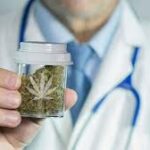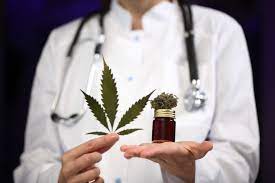Understanding Bipolar Disorder
Bipolar disorder, formerly known as manic-depressive illness, is a mental health condition characterized by extreme mood swings that include emotional highs (mania or hypomania) and lows (depression). These mood swings can affect sleep, energy levels, thinking, and behavior, leading to significant disruptions in daily life.

Traditional Treatment Approaches
Traditionally, bipolar disorder has been managed through a combination of psychotherapy and medication. Mood stabilizers, antipsychotic medications, antidepressants, and psychotherapy are commonly prescribed to help stabilize mood, manage symptoms, and improve quality of life for individuals with bipolar disorder.
The Role of Medical Marijuana
In recent years, there has been growing interest in the potential therapeutic effects of medical marijuana for various mental health conditions, including bipolar disorder. While research is still in its early stages, some studies suggest that certain compounds found in marijuana, such as cannabidiol (CBD) and tetrahydrocannabinol (THC), may have mood-stabilizing properties and could potentially offer relief from symptoms associated with bipolar disorder.
CBD and Bipolar Disorder
CBD, a non-intoxicating compound found in marijuana, has been the subject of numerous studies exploring its potential therapeutic effects. Some research suggests that CBD may help alleviate symptoms of anxiety, depression, and mood swings, which are common symptoms of bipolar disorder. Additionally, CBD may have neuroprotective properties that could benefit individuals with bipolar disorder by protecting against brain damage and promoting neuroplasticity.
THC and Bipolar Disorder
THC, the psychoactive compound in marijuana responsible for the "high" sensation, has also shown promise in managing symptoms of bipolar disorder. While THC may exacerbate symptoms in some individuals, others report experiencing mood stabilization and symptom relief with THC-containing products. However, it's essential to note that the effects of THC can vary depending on factors such as dosage, strain, and individual tolerance levels.

Potential Benefits of Medical Marijuana for Bipolar Disorder
Mood Stabilization
One of the primary goals of treating bipolar disorder is to achieve mood stabilization, preventing extreme highs and lows. Some individuals with bipolar disorder report that medical marijuana helps regulate their mood, reducing the frequency and intensity of mood swings.
Anxiety and Depression Relief
Anxiety and depression often co-occur with bipolar disorder and can significantly impact an individual's quality of life. Medical marijuana, particularly CBD-rich strains, may offer relief from symptoms of anxiety and depression, providing a sense of calm and improving overall well-being.
Sleep Improvement
Sleep disturbances are common among individuals with bipolar disorder and can exacerbate mood symptoms. Medical marijuana, especially strains with higher CBD content, may help promote relaxation and improve sleep quality, leading to better mood regulation and overall functioning.
Pain Management
Chronic pain is a common comorbidity in individuals with bipolar disorder, often resulting from physical health conditions or medication side effects. Medical marijuana has been shown to have analgesic properties, offering relief from pain without the risk of addiction or overdose associated with opioid medications.

Appetite Stimulation
Some individuals with bipolar disorder may experience appetite changes as a result of medication side effects or mood symptoms. Medical marijuana, particularly strains high in THC, may stimulate appetite and help individuals maintain a healthy weight.

Conclusion
While research on the use of medical marijuana for bipolar disorder is still evolving, preliminary evidence suggests that it may offer potential benefits in managing symptoms such as mood swings, anxiety, depression, sleep disturbances, pain, and appetite changes. However, it's essential for individuals considering medical marijuana as a treatment option to consult with a qualified healthcare provider to weigh the potential risks and benefits and develop a personalized treatment plan tailored to their individual needs and preferences.
Frequently Asked Questions (FAQs) About Medical Marijuana for Bipolar Disorder
1. Is medical marijuana legal for treating bipolar disorder?
In some jurisdictions, medical marijuana is legal for therapeutic use, including the management of mental health conditions like bipolar disorder. However, the legality of medical marijuana varies by country and state. It's essential to research and adhere to local regulations regarding the use of medical marijuana for bipolar disorder.
2. How does medical marijuana interact with traditional bipolar disorder medications?
The interaction between medical marijuana and traditional bipolar disorder medications can vary depending on factors such as the specific medications involved, dosage, and individual differences in metabolism. Some individuals may experience enhanced therapeutic effects or reduced side effects when combining medical marijuana with traditional medications, while others may experience adverse reactions or medication interactions. It's crucial to consult with a healthcare provider knowledgeable about medical marijuana and bipolar disorder to discuss potential interactions and develop a safe and effective treatment plan.
3. Can medical marijuana worsen symptoms of bipolar disorder?
While medical marijuana may offer potential benefits for some individuals with bipolar disorder, it's essential to recognize that it can also have adverse effects, including exacerbating mood symptoms in some cases. THC, the psychoactive compound in marijuana, can induce psychosis-like symptoms in susceptible individuals or trigger manic episodes in those with bipolar disorder. Additionally, excessive or unregulated use of medical marijuana may lead to dependence or addiction. Therefore, it's essential for individuals considering medical marijuana as a treatment option to weigh the potential risks and benefits and consult with a qualified healthcare provider.
4. Are there specific strains of medical marijuana recommended for bipolar disorder?
There is limited research on the efficacy of specific strains of medical marijuana for bipolar disorder. However, some individuals with bipolar disorder report finding relief from symptoms with CBD-dominant strains, which contain higher levels of cannabidiol and lower levels of THC. CBD is non-intoxicating and has been studied for its potential antipsychotic, anxiolytic, and mood-stabilizing properties. It's essential for individuals considering medical marijuana to experiment cautiously with different strains and consult with a healthcare provider knowledgeable about medical marijuana and bipolar disorder to determine the most appropriate treatment approach.
5. How can I access medical marijuana for bipolar disorder treatment?
Access to medical marijuana for bipolar disorder treatment varies depending on the legal and regulatory framework in your jurisdiction. In regions where medical marijuana is legal, individuals may need to obtain a recommendation or prescription from a qualified healthcare provider and register with a state or national medical marijuana program to access products from licensed dispensaries. It's crucial to research and adhere to local regulations regarding the use of medical marijuana and consult with a healthcare provider knowledgeable about medical marijuana and bipolar disorder to navigate the process safely and legally.
